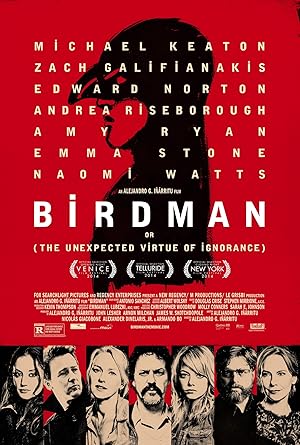
Birdman or (The Unexpected Virtue of Ignorance)
Synopsis
Actor Riggan Thomson is most famous for his movie role from over twenty years ago of the comic book superhero Birdman in the blockbuster movie of the same name and its two equally popular sequels. His association with the role took over his life, where Birdman is more renowned than "Riggan Thomson" the actor. Now past middle age, Riggan is trying to establish himself as a true artist by writing, directing, starring in and co-producing with his best friend Jake what is his Broadway debut, an adaptation of Raymond Carver's story, What We Talk About When We Talk About Love. He is staking his name, what little artistic reputation that comes with that name and his life savings on the project, and as such will do anything needed to make the play a success. As he and Jake go through the process of the previews toward opening night, Riggan runs into several issues: needing to find a replacement for the integral supporting male role the night before the first preview; hiring the talented Broadway name, Mike Shiner, for that role, Mike who ends up being difficult to work with and who may end up overshadowing Riggan in the play; having to deal potentially with a lawsuit based on one of his actions to ensure success; needing to be there for his daughter, Sam, who he has hired to be his production assistant and who has just come out of drug rehab; and pleasing the New York Times critic, Tabitha Dickinson, who wants to use any excuse to give the play a scathing review which in turn would close the show after the opening night performance. But Riggan's biggest problem may be his own insecurities, which are manifested by him constantly hearing what he believes to be the truth from the voice of his Birdman character, who he often battles both internally and externally.
Critical Acclaim
The 2014 release of Birdman or (The Unexpected Virtue of Ignorance) marked a pivotal moment in contemporary cinema, receiving widespread critical acclaim for its innovative storytelling and technical prowess. Directed by Alejandro González Iñárritu, the film was celebrated for its seemingly single-take cinematography, achieved by Emmanuel Lubezki, which created a seamless and immersive experience. Critics praised the film's exploration of fame and identity, with Michael Keaton's performance as Riggan Thomson drawing particular attention for its depth and authenticity. The film's unique blend of dark comedy and existential drama resonated with audiences and critics alike.
Prominent critics lauded the film's artistic ambition and execution. Richard Roeper of the Chicago Sun-Times described it as “a masterful film about the nature of identity and the quest for meaning.” A.O. Scott of The New York Times wrote that the film "crackles with energy and precision," highlighting its "audacious" approach to storytelling. In modern assessments, Birdman holds a 91% approval rating on Rotten Tomatoes, underscoring its enduring appeal and critical consensus. The film's intricate narrative and technical achievements continue to be the subject of analysis in film studies.
Birdman's critical success translated into notable accolades, including four Academy Awards: Best Picture, Best Director for Iñárritu, Best Original Screenplay, and Best Cinematography for Lubezki. Its impact on the film industry is evident in the way it challenged traditional narrative structures and inspired filmmakers to experiment with form and content. The film is frequently cited in discussions about the evolution of cinematic techniques and remains a significant work in Iñárritu's filmography, solidifying its status as a modern classic.
Track your movie viewing progress at Your Watchlists